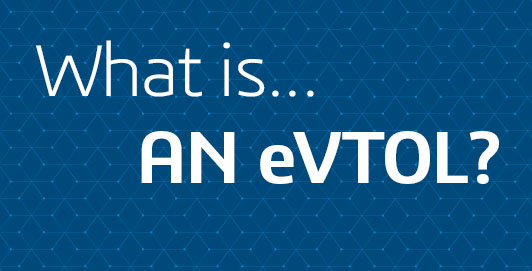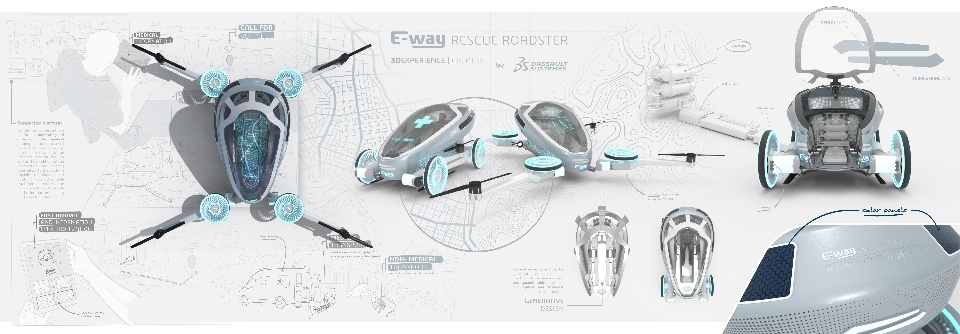
Have you ever sat in bumper-to-bumper traffic, staring at the clock, wishing you’d left 15 minutes earlier? Cursing the congestion. Dreaming about better ways to get around the city. Wishing your car could fly. Well flying cars aren’t just some futuristic fantasy from “The Jetsons” or “Blade Runner.”
Electric Vertical Take-Off and Landing aircraft, more commonly known as eVTOL vehicles, offer real potential to impact urban air mobility markets in the near term. Experts in the aerospace and defense industry predict we could begin to see airport shuttles, on-demand air taxis and even air ambulances within the next few years.
Key players from the aerospace industry – from Airbus, Boeing and Bell Helicopter to JetBlue, American Airlines and Brazil’s Azul – have made major investments in eVTOL development. Automotive companies are getting into the game, as well. And, in some cities, construction’s already underway on “vertiports,” which will allow eVTOL vehicles to take off and land atop buildings, parking garages and other structures.
How will eVTOL vehicles be used?
eVTOL vehicles have long been a vision of aviation entrepreneurs. Advances in battery tech and composite materials – not to mention an influx of a few billion in cash into the emerging industry – has brought those dreams close to reality. Designs vary – some are winged, some are wingless; some piloted and some autonomous – but the majority feature aerodynamic pods and multiple propulsion units that drive electric motors. Typically they’ll be able to carry a pilot and a few passengers, with a range of a couple hundred miles at a range of speeds.
Download our whitepaper on designing safe and quiet eVTOL vehicles with simulation
Unlike helicopters, eVTOL vehicles emit zero emissions and are quiet. eVTOLs are likely to be easier to maintain, safer to fly and cheaper to operate than helicopters, as well. Helicopters won’t disappear, but many expect eVTOLs will quickly become a vehicle of choice for short commutes in urban areas.

These won’t quite be the flying cars fans of the Jetsons pictured. Meaning, most families won’t commute from home to school and work in personal eVTOL vehicles. Air taxis, flying ambulances and cargo transport are likely to be among the most common uses – at least early on.
3DS expert weighs in
, are working with 3DS to advance their eVTOL designs. The “Reinvent the Sky” industry solution on the 3DEXPERIENCE platform offers an array of capabilities to support complex development of prototypes and multi-disciplinary collaboration and testing. Czech startup Zuri is using the 3DEXPERIENCE platform on cloud to design its hybrid VTOL vehicle.
It makes sense these eVTOL innovators would turn to Dassault Systèmes. CATIA on the 3DEXPERIENCE platform fully integrates the cross-discipline modeling, verification and business process support needed for the job. SIMULIA PowerFLOW and XFlow tools can be used to perform aerodynamic and aeroacoustic optimization. A cloud-based platform like the 3DEXPERIENCE platform can help startups accelerate development, analyzing, simulating, certifying and experiencing eVTOL vehicles in a virtual environment.
On the infrastructure side, UK-based Urban-Air Port has selected Dassault Systemes’ 3DEXPERIENCE platform to support development of its vertiport ventures globally, beginning with their first model vertiport in Coventry, UK.
What’s next for eVTOL vehicles?
There are at least 200 commercial eVTOL projects underway worldwide, according to the Vertical Flight Society (VFS), the professional society for the advancement of vertical flight technology and its useful applications. These projects feature an array of different configurations and uses.
Around the world, eVTOL aircraft are being developed by large original equipment manufacturers and startups alike. They’re all racing to become the first to develop a certifiable system and the associated infrastructure. Industry experts project the market will be worth about $9.1 billion USD (€8.64 billion) by 2030.
Piloted eVTOL vehicles will be the first wave, while autonomous passenger transport is still further off. The US-based Federal Aviation Administration (FAA) and European Union’s Aviation Safety Agency (EASA) are working with a few dozen companies to certify vehicle designs. But there’s still work to be done before commercial operations take flight.
Air traffic management rules, infrastructure and public acceptance are just a few of the challenges still ahead. But the key players all seem to agree: flying cars and air taxis are in our near future.
Related content:

